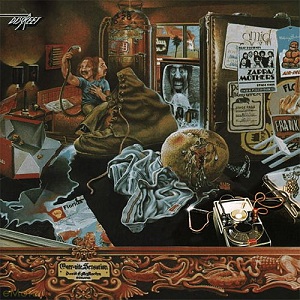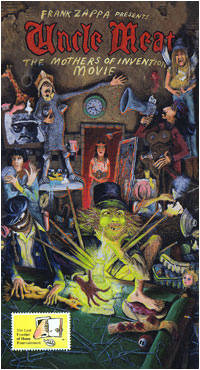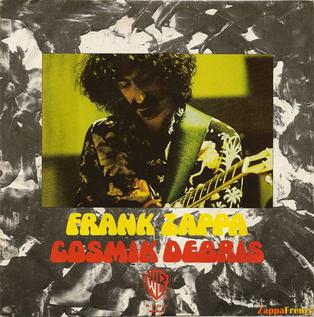Personnel
| | This section needs expansion. You can help by adding to it. (June 2020) |
- Frank Zappa – vocals, lead guitar
- George Duke – piano
- Tom Fowler – bass guitar
- Aynsley Dunbar – drums
| "Uncle Remus" | |
|---|---|
| Song by Frank Zappa | |
| from the album Apostrophe (') | |
| Released | March 1974 |
| Recorded | May 24, 1972 c. 1973 |
| Length | 2:50 |
| Label | DiscReet |
| Songwriter(s) | Frank Zappa George Duke |
| Producer(s) | Frank Zappa |
"Uncle Remus" is a song written by American musicians Frank Zappa and George Duke, and first released on Zappa's 1974 album Apostrophe (') . [1] [2] The name of the song is derived from Uncle Remus, a fictional character found in works by writer Joel Chandler Harris. The song has been said to reflect Zappa's feelings about racism and the civil rights movement, themes which had previously been explored in his earlier song "Trouble Every Day".
The lyrics of "Uncle Remus" have been said to reflect Zappa's thoughts regarding racial tensions in the United States, including the civil rights movement and civil rights work that has not been done. [2] [3] It has also been described as an extension of Zappa's feelings on racism featured on his earlier song "Trouble Every Day". [4] The lyrics, "Just keep your nose, to the grindstone they say. Will that redeem us, Uncle Remus", questions whether despite their best efforts, if racial equality can ever be achieved. Author Ben Watson called the song "a gentle reprimand, noting how protest was being abandoned for fashion", citing Zappa's mention of growing a "'fro", along with water from fire hoses used in protests having the potential to harm "sharp" clothes. [5]
The song's lyrics also refer to lawn jockeys, [5] [6] statuettes that often depicted black figures with exaggerated features. Zappa sings about targeting jockeys on the lawns of "rich people" as a form of protest in Beverly Hills, suggesting a connection between class and race. [7]
"Uncle Remus" first appeared on Zappa's eighteenth album, Apostrophe (') , released in March 1974. [1] [2] Duke released an alternate version of the song with a more gospel-like arrangement on his 1975 album The Aura Will Prevail . [8] [9] Yet another alternate version of the song, "Uncle Remus (Mix Outtake)", was included on the 2016 Zappa compilation album The Crux of the Biscuit . [10] [11] Another alternate version, this time instrumental, was released on Zappa's 2022 boxset Waka/Wazoo.
| | This section needs expansion. You can help by adding to it. (June 2020) |

Frank Vincent Zappa was an American musician, composer, and bandleader. In a career spanning more than 30 years, Zappa composed rock, pop, jazz, jazz fusion, orchestral and musique concrète works; he also produced almost all of the 60-plus albums that he released with his band the Mothers of Invention and as a solo artist. His work is characterized by nonconformity, improvisation sound experimentation, musical virtuosity and satire of American culture. Zappa also directed feature-length films and music videos, and designed album covers. He is considered one of the most innovative and stylistically diverse musicians of his generation.

Uncle Remus is the fictional title character and narrator of a collection of African American folktales compiled and adapted by Joel Chandler Harris and published in book form in 1881. Harris was a journalist in post–Reconstruction era Atlanta, and he produced seven Uncle Remus books. He did so by introducing tales that he had heard and framing them in the plantation context. He wrote his stories in a dialect which was his interpretation of the Deep South African-American language of the time. For these framing and stylistic choices, Harris's collection has garnered controversy since its publication. Many of these stories are believed to have Creek Indian influence too.

Absolutely Free is the second album by American rock band the Mothers of Invention, released on May 26, 1967, by Verve Records. Much like their 1966 debut Freak Out!, the album is a display of complex musical composition with political and social satire.

Apostrophe (') is the sixth solo album and eighteenth in total by Frank Zappa, released in March 1974 in both stereo and quadraphonic formats. An edited version of its lead-off track, "Don't Eat the Yellow Snow", was the first of Zappa's three Billboard Top 100 hits, ultimately peaking at number 86. The album itself became the biggest commercial success of Zappa's career, reaching number 10 on the US Billboard 200.

Over-Nite Sensation is the twelfth album by The Mothers of Invention, and the seventeenth album overall by Frank Zappa, released in September 1973. It was Zappa's first album released on his DiscReet label.

Quaudiophiliac is a compilation album featuring music by Frank Zappa, released in DVD-Audio format by Barking Pumpkin Records in 2004. It compiles recordings he made while experimenting with quadraphonic, or four-channel, sound in the 1970s. Zappa prepared quadraphonic mixes of a number of his 1970s albums, with both Over-Nite Sensation (1973) and Apostrophe (') (1974) being released in discrete quadraphonic on Zappa's DiscReet Records label.

The Mothers of Invention was an American rock band from California. Formed in 1964, their work is marked by the use of sonic experimentation, innovative album art, and elaborate live shows.

Thing-Fish is an album by Frank Zappa, originally released as a triple album box set on Barking Pumpkin Records in 1984. It was billed as a cast recording for a proposed musical of the same name, which was ultimately not produced by Zappa, but later performed partially in 2003, ten years after his death.

Roxy & Elsewhere is a double live album by Frank Zappa and The Mothers, released on September 10, 1974. Most of the songs were recorded on December 8, 9 and 10, 1973 at The Roxy Theatre in Hollywood, California.

Napoleon Murphy Brock is an American singer, saxophonist and flute player who is best known for his work with Frank Zappa in the 1970s, including the albums Apostrophe ('), Roxy & Elsewhere, One Size Fits All, and Bongo Fury. He contributed notable vocal performances to the Zappa songs "Village of the Sun," "Cheepnis," and "Florentine Pogen."

You Can't Do That on Stage Anymore, Vol. 3 is a double disc live album by Frank Zappa, spanning from December 10, 1971, to December 23, 1984. It was released in 1989.

You Can't Do That on Stage Anymore, Vol. 6 is the last of six double-disc collection volumes of live performances by Frank Zappa recorded between 1970 and 1988. All of the material on Disc one has a sexual theme. Zappa used the monologue in "Is That Guy Kidding or What?", to ridicule Peter Frampton's album I'm in You with its double entendre title and pop pretensions. Disc two includes performances from Zappa's shows between 1976 and 1981 at the Palladium in New York City, as well as material like "The Illinois Enema Bandit" and "Strictly Genteel" that he frequently used as closing songs at concerts. It was released on October 23, 1992, under the label Rykodisc.
"Inca Roads" is the opening track of the Frank Zappa and the Mothers of Invention 1975 album, One Size Fits All. The song features unusual time signatures, lyrics and vocals. The marimba-playing of Zappa's percussionist Ruth Underwood is featured prominently. The song was played in concert from 1970 to 1976, 1979 and 1988.

Uncle Meat is a 1987 film written and directed by Frank Zappa. It was conceived in 1968 as a vehicle for the Mothers of Invention, but remained unfinished until 20 years after the production began.

"Cosmik Debris" is a song by American composer Frank Zappa, from his 1974 album Apostrophe (').
"Willie the Pimp" is a song from Frank Zappa's 1969 album Hot Rats. It features an idiosyncratic Captain Beefheart vocal and one of Zappa's classic guitar solos. It is the only track that is not instrumental on the album, though the track features a long guitar solo.

"Trouble Every Day" is a song by the Mothers of Invention, released on their 1966 debut album Freak Out!
Uncle Remus is the titular fictional narrator of a collection of stories by Joel Chandler Harris.

"Don't Eat the Yellow Snow" is a suite by the American musician Frank Zappa, made up of the first four tracks of his 1974 album Apostrophe ('): "Don't Eat the Yellow Snow", "Nanook Rubs It", "St. Alfonzo's Pancake Breakfast", and "Father O'Blivion". Each song in the suite is loosely connected, although the songs are not all connected by one overall story/theme. The suite was only played in full from 1973 to 1974 and 1978 to 1980. "Saint Alfonzo's Pancake Breakfast" contains Zappa's percussionist Ruth Underwood on marimba, who added a very distinct sound to many of his songs in the early 1970s.

Waka/Wazoo is a boxset by Frank Zappa, released posthumously on December 16, 2022. It is a 4CD/1-Blu-ray set composed of various material recorded in 1972, during a period when Zappa was forced away from live performances due to injuries sustained during a concert on December 10, 1971. This includes recordings from the same Paramount Studios sessions which birthed the albums Waka/Jawaka and The Grand Wazoo, and live material from the following tours of the same year.